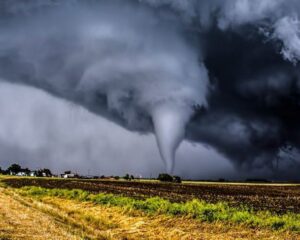
In a new episode of the Experts Club YouTube channel, Maksim Urakin, PhD in Economics, presented an analysis of macroeconomic trends in Ukraine and the world based on official data from the State Statistics Service of Ukraine, the NBU, the UN, the IMF, and the World Bank.
Macroeconomic Indicators of Ukraine
Maksim Urakin cited data from Ella Libanova, Director of the Institute for Demography and Social Studies, who estimates that about 50% of citizens will return after the war.
“Demographics is an important factor for economic recovery, but the threat of depopulation and labor shortages cannot be ignored. In the medium term, the decline in the demographic growth potential in Ukraine can only be offset by migration,” Urakin emphasized.
The expert noted that the main risks to the economy remain the duration of the war and the instability of international aid.
“In the third quarter of 2023, Ukraine’s GDP growth slowed to 8.2%. The negative balance of foreign trade increased 3.2 times, which is an alarming signal. The public debt has slightly decreased compared to August figures, but in 2024 it may exceed the country’s GDP for the first time, which poses significant risks to economic stability,” the economist said.
Prospects for the Global Economy
The founder of Experts Club also analyzed the global economy, noting a slowdown in growth in 2024 to 2.2%.
“One of the key reasons for the slowdown in global economic growth is the decline in GDP in developed countries. We are witnessing the lowest GDP growth in developed countries since the 1980s, with the exception of the global financial crisis and the COVID-19 pandemic. The unprecedented cycle of interest rate hikes by major central banks in recent years has also played a significant role in slowing growth. These rate hikes are driven by the need to control inflation, but at the same time, they limit economic activity,” the expert explains.
According to the expert, the current macroeconomic situation in Ukraine and the world requires further analysis. For Ukraine, the main challenges in the coming years will be the need to restore Ukraine after the war and manage the public debt.
For more information on the situation in the Ukrainian and global economy, please see the video on the YouTube channel “Club of Experts” at the link: https://www.youtube.com/watch?v=byJnfmie7bM
You can subscribe to the channel here: https://www.youtube.com/@ExpertsClub
ECONOMY, economy review, EXPERTS CLUB, MACROECONOMICS, URAKIN, world economy

Cumulative damage to the world economy from natural disasters in 2022 decreased by about 15% compared with 2021 and amounted to about $270 billion against $320 billion, according to preliminary data from Germany’s Munich Re, the largest reinsurance company in the world.
The volume of insured losses, meanwhile, remained virtually unchanged at $120 billion.
Economic losses last year were in line with the average of the previous five years, while insured losses were well above average ($97 billion in 2017-21).
“It is alarming that natural disasters particularly affect citizens in the poorest countries. That’s why preventive measures and financial protection, such as insurance, are especially important,” said Thomas Blunk, a member of Munich Re’s board of directors.
The most devastating event of the past year was Hurricane Ian, which struck the Florida coast in September, bringing wind gusts of nearly 250 kilometers per hour. It caused an economic loss of $100 billion, with insured losses of $60 billion. In terms of damages when adjusted for inflation, Ian is second only to Hurricane Katrina in 2005.
In second place is the flooding in Pakistan, caused by a record monsoon in terms of rainfall. Some 1,700 people were victims of the flooding, and the direct damage was at least $15 billion, virtually all of it uninsured.
“When analyzing the data for 2022, there are two key factors to keep in mind. First, the La Niña phenomenon is in its third consecutive year, increasing the likelihood of hurricanes in North America, flooding in Australia, drought and heat waves in China, and heavy monsoons in parts of South Asia. In addition, extreme weather events have become more frequent due to climate change. Sometimes these factors overlap,” wrote Ernst Rauch, chief climate scientist at Munich Re.

Recession will affect one third of the world economy in 2023, Managing Director of the International Monetary Fund (IMF) Kristalina Georgieva has predicted.
This year will be tougher on the world economy than the one we left behind, she warned.
“Why? Because the three major economies — the U.S., the EU and China — are slowing down at the same time,” the IMF chief said in an interview broadcast Sunday on CBS. – “We expect one-third of the world economy to be in recession.
Even in countries whose economies won’t decline, “hundreds of millions of people will feel it as a recession,” she added.
While the U.S. may eventually avoid a recession, the situation looks bleaker in Europe, which has been hit hard by Russia’s war against Ukraine, Georgieva said. “Half of the European Union will be in recession,” she noted.
“For the first time in 40 years, China’s growth in 2022 is likely to be at or below global growth,” Georgieva said. – Before the COVID-19 pandemic, China accounted for 35-40% of global growth. It won’t be like that anymore.”
These are “pretty stressful” times for Asian economies, she said.
“When I talk to Asian leaders, they all start with the question: what will happen to China? Will China return to a higher growth rate?” she said.
Georgieva expects China to gradually move to a “higher economic performance and end the year with better results” than it began.
The IMF predicts that global GDP will increase by 2.7% this year after growing 3.2% in 2022.